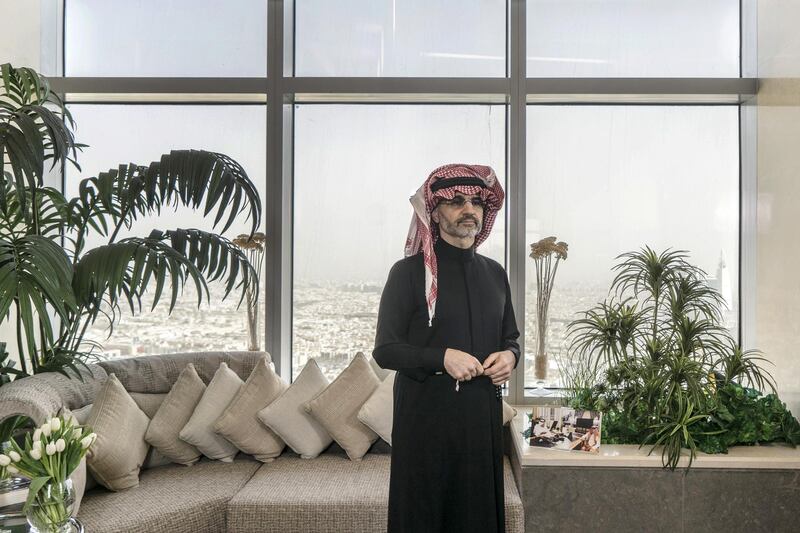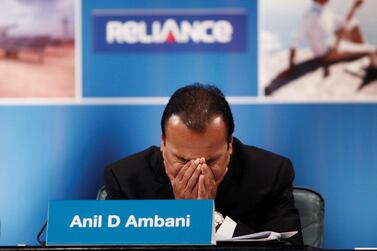Prince Alwaleed bin Talal
Prince Alwaleed bin Talal, the Saudi billionaire whose wealth has more than halved since 2014, promised more transparency on his settlement with the government over alleged corruption in the hope the move would calm investors.
The prince, who was detained in a November 2017 government crackdown on corruption, said he may reveal more details on the terms of his release in the “coming weeks or months” so shareholders in Kingdom Holding, his publicly-traded investment company, “will be more comfortable”.
“Maybe the market still wants more transparency," Prince Alwaleed said in a rare interview with his television channel, Rotana Khalijia. "I admit there’s some confusion for them now.”
Prince Alwaleed’s fortune has fallen to $15.5 billion (Dh56.9bn) from a high of $36bn in 2014, according to the Bloomberg Billionaires Index. The prince said the decline was due to a slump in Kingdom Holding shares, which tumbled about 60 per cent over that period, and was not because of any agreement or settlement he made during his detention.
About half of Prince Alwaleed’s wealth is tied to shares in Kingdom Holding, in which he owns a 95 per cent stake.
Kingdom Holding shares slumped about 20 per cent in the days after his detention and are yet to fully recover.
The billionaire was released in January 2018 after reaching what he called a confidential “confirmed understanding” with the government. The prince has refused to reveal details of the agreement, other than to confirm he still had control of his assets, including Kingdom Holding and his media company Rotana.
Most of the detainees were released after reaching settlements and the government said it has recovered more than $100bn for state coffers.
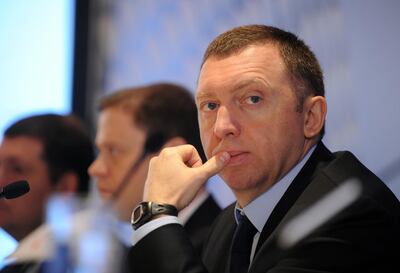
Oleg Deripaska
Russian oligarch Oleg Deripaska is suing the US treasury for sanctions that he said are unfairly destroying his global businesses, claiming a $7.5bn loss.
Mr Deripaska, who made his fortune in the metals industry, said the sanctions are based on unproven allegations about his close ties to the government of Russian President Vladimir Putin. The suit named the US Treasury, Treasury Secretary Steven Mnuchin and Andrea Gacki, the head of the Treasury's sanctions unit.
In his complaint, the magnate said he is “the latest victim” of “political infighting and ongoing reaction to Russia’s purported interference” with the 2016 US presidential election.
The Treasury’s Office of Foreign Assets Control, or OFAC, unfairly targeted Mr Deripaska, causing his net worth to drop by $7.5bn as banks withdrew credit and other businesses refused to work with him, according to the suit. The Bloomberg Billionaires Index estimates his net worth at $3.9bn, after dropping $5.8bn last year, the most among Russia’s ultra-wealthy.
“I have filed a civil complaint against the Treasury and OFAC to clear my name and remove the sanctions that have been arbitrarily imposed on me for political reasons,” Mr Deripaska said in an Instagram post. “This is about simple justice.”
The US government sanctions – which froze any of his assets over which it had jurisdiction and largely barred people in the US from dealing with him – have resulted in “the utter devastation of Mr Deripaska’s wealth, reputation and economic livelihood,” according to the complaint.
Mr Deripaska was among the most prominent tycoons hit with sanctions by President Donald Trump’s administration. The move followed passage of a law to retaliate against Moscow for its election meddling. In April 2018, the Treasury slapped sanctions on Mr Deripaska and six other Russians it labelled oligarchs in response to the Kremlin’s “malign activity around the globe”.
The Treasury said Mr Deripaska had, at times, acted on behalf of the Russian government and that he had previously been accused of threatening the lives of business rivals and participating in extortion and racketeering.
In January, Treasury announced it would formally remove sanctions on Rusal, the world’s second-largest aluminium producer, as part of an agreement with Mr Deripaska to hand over control of his company to individuals selected by the US. Mr Deripaska is still under US sanctions and his property is blocked.
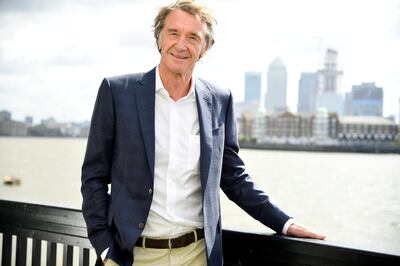
Jim Ratcliffe
Britain's richest man, reclusive chemicals tycoon Jim Ratcliffe, bought the world's most successful cycling group, transforming Team Sky into Team Ineos.
Broadcasting giant Sky had in December announced it would end its decades-long link with Team Sky, which won eight Grand Tour cycling victories – including six Tour de France titles.
Brexit-backing Mr Ratcliffe, who has reportedly shifted his fortune to Monaco for tax reasons, will in May launch Team Ineos, named after the chemicals giant that he founded, with the hope of extending the cycling team's global dominance.
The 66-year-old Ineos chairman has assets worth an estimated £21bn (Dh102bn), placing him top of the 2018 Sunday Times rich list.
He was only 18th on the previous year's list but the value of his company, of which he owns 60 per cent, soared to propel him up the ranks and earning him a knighthood from Queen Elizabeth II.
Mr Ratcliffe, a marathon runner and keen cyclist, is no stranger to investing in British sport having ploughed £110 million into British sailor Ben Ainslie's America's Cup team.
He has also invested in Swiss football club FC Lausanne, despite being a Manchester United fan. Recent media reports have said that Mr Ratcliffe was considering a potential takeover of Premier League football club Chelsea, owned by Russian tycoon Roman Abramovich.
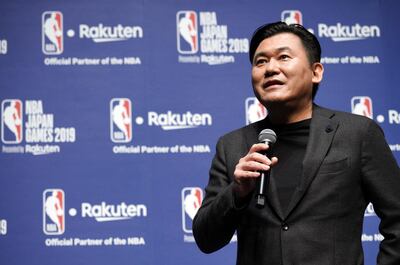
Hiroshi Mikitani
Hiroshi Mikitani, the founder and chief executive of Japan's biggest e-commerce retailer, has a new goal for his 17,000 employees: learn to code. Less than a decade after stunning workers at Rakuten with an edict to learn English, Mr Mikitani wants to do the same with computer programming.
“If you’re working for Toyota, for example, you know how the automobile works – basic structure of the engine, suspension and so forth,” Mr Mikitani told Bloomberg Television. “So if you work for an IT services company, you need to have the basic knowledge of what’s in the computer.”
Mr Mikitani, who has a net worth of $5.3bn according to the Bloomberg Billionaires Index, pioneered e-commerce in Japan when he founded the company more than two decades ago. While it amassed more than 100 million registered IDs, Rakuten has steadily lost ground to Amazon as well as a new breed of upstarts such as Mercari and Zozo.
Instead, it has come to increasingly rely on a disparate portfolio of about 80 different businesses that span banking and insurance to online ads and drone deliveries. Without a market leading position in any of those areas, Rakuten is building a wireless network that it hopes will tie the services together and convince users to spend more on the platform.
Starting in 2018, Rakuten made programming a core part of training for newly hired graduates with about 260 non-engineering recruits taking a six-month course that includes entry-level Java and basic skills for building network architecture. Another 400 new recruits coming in April will spend three months in the programme, which concludes with a hackathon for grads to create their own product and be judged by their co-workers.
In 2014 Rakuten spent $900m to buy messaging service Viber, which competes with Facebook's WhatsApp. In 2015, Rakuten invested $300m in ride-sharing company Lyft, an Uber competitor, and Mr Mikitani joined Lyft's board.
In 2017 Mr Mikitani struck multi-year sponsorship deals worth $120m with two sports teams: the NBA's Golden State Warriors and football club FC Barcelona.
